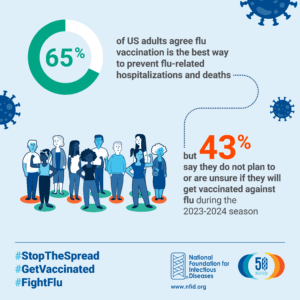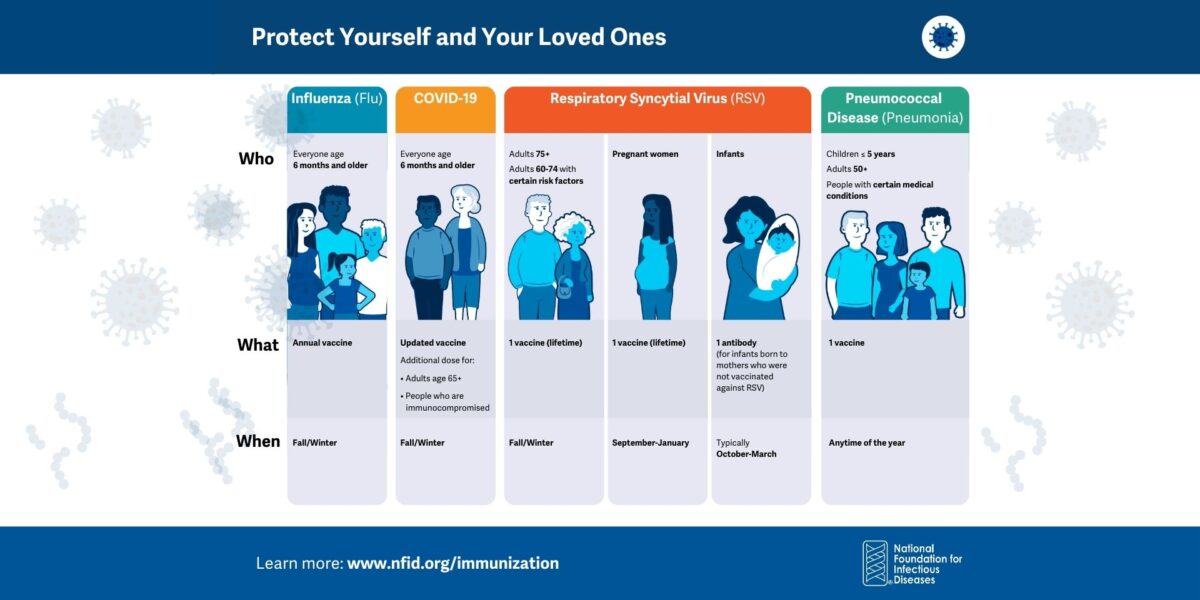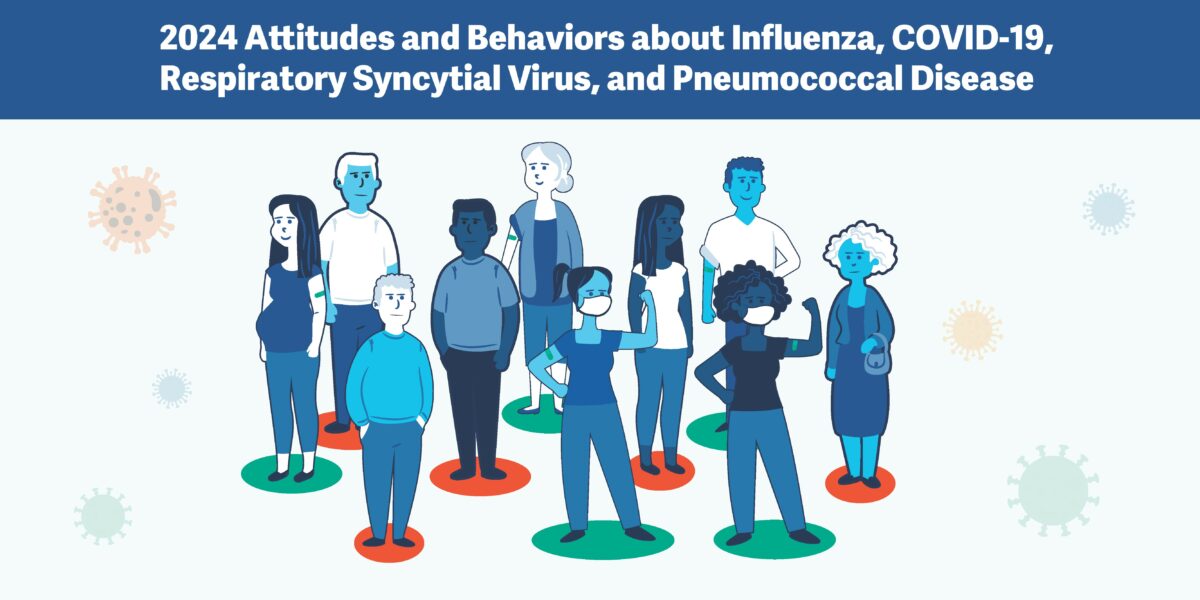
The National Foundation for Infectious Diseases (NFID) commissioned an annual survey to better understand beliefs about influenza (flu), COVID-19, respiratory syncytial virus (RSV), and pneumococcal disease, as well as attitudes and practices around vaccination.
Overall, the survey found that many US adults underestimate the seriousness of these respiratory diseases. As a result, many do not plan to get vaccinated and are not confident in the safety and effectiveness of vaccines. These findings underscore the need to raise awareness of the benefits of vaccines and highlight the importance of strong vaccine recommendations from healthcare professionals. The survey, conducted August 10-14, 2023, included 1,000 complete responses—913 via the web and 87 via telephone—from US adults age 18 years and older representing the 50 states and the District of Columbia.
Summary of Key Results
Attitudes and Practices around Flu Vaccination
Overall, most US adults believe annual flu vaccination is the best protection against flu, but many do not plan to get vaccinated against flu during the 2023-2024 season.
 65% agree that annual flu vaccination is the best preventive measure against flu-related hospitalizations and deaths, but 43% say they do not plan to or are unsure they will get vaccinated against flu this season
65% agree that annual flu vaccination is the best preventive measure against flu-related hospitalizations and deaths, but 43% say they do not plan to or are unsure they will get vaccinated against flu this season- 72% of adults age 65 years and older plan to get a flu vaccine, compared with only 52% of adults age 18-64 years
- Among those who do not plan to get a flu vaccine, top reasons cited include:1
-
- 32% are concerned about potential side effects from the vaccine
- 31% do not trust vaccines
- 27% do not think vaccines work very well
- 27% are concerned about getting sick from vaccines
- Only 22% of US adults are very or extremely concerned about themselves or someone in their family getting infected with flu
- More than 1 in 4 US adults (28%) who are at higher risk2 for flu-related complications said that they were not planning to get vaccinated this season
Sources of Information and Trust
Healthcare professionals are the primary and most trusted source of information about flu vaccines.
- Most US adults (75%) trust healthcare professionals a great deal or a lot3, far more than other sources
- 54% of US adults trust the Centers for Disease Control and Prevention (CDC) a great deal or a lot and 47% trust state and local health departments a great deal or a lot
- Adults age 18-64 years are less trusting of doctors (63%) than adults age 65 years and older are (80%)
Attitudes and Intentions around COVID-19
- Only 23% of US adults are very or extremely concerned about themselves or someone in their family getting infected with COVID-19
- Only 40% of US adults plan to get an updated COVID-19 vaccine
- Among those who do not plan to get an updated COVID-19 vaccine, nearly half (48%) are concerned about side effects from the vaccine. Others reported that they:4
- Do not trust vaccines (34%)
- Do not think that vaccines work very well (28%)
- Are concerned about getting sick from vaccines (27%)
- Do not think COVID-19 is a serious illness (13%)
Attitudes and Intentions around RSV
- Only 19% of US adults are very or extremely concerned about themselves or someone in their family getting infected with RSV
- Among adults age 60 years and older, only 40% plan to get an RSV vaccine
- Among US adults age 60 years and older who do not plan to get an RSV vaccine, top reasons cited include:5
- Concerns about side effects from the vaccine (33%)
- Do not trust vaccines (28%)
- Have not been advised to get an RSV vaccine (27%)
- Concerns about getting sick from the vaccine (25%)
Concerns about Flu and COVID-19 Vaccine Coadministration
Most US adults (62%) would not or are unsure about getting vaccinated against flu and COVID-19 at the same time
- Only 38% of US adults would get a flu and COVID-19 vaccine at the same time, if offered
- Among those who would not get a flu and COVID-19 vaccine at the same time, top reasons cited include:6
- Concerns about the side effects from getting both vaccines at the same time (56%)
- Do not think it is safe to get both at the same time (37%)
- Have not been advised to get both at the same time (21%)
- Do not think the vaccines will work well if received at the same time (18%)
Attitudes around Testing and Treatment for Flu, COVID-19, and RSV
- 2 in 3 US adults (66%) would use an at-home test, if available, that would accurately and quickly diagnose flu, COVID-19, and RSV at the same time
- Approximately 3 in 4 US adults (78%) would take an antiviral medication to help reduce severe flu or COVID-19 symptoms if prescribed by a doctor or other healthcare professional
Masking Behaviors This Fall and Winter
- Only about 1 in 4 US adults (26%) report they will wear a mask in healthcare settings this fall and winter
- Black (39%) and Hispanic (33%) adults are more likely than White (19%) adults to wear a mask in a doctor’s office, pharmacy, or hospital this season
Knowledge and Attitudes around Pneumococcal Disease
- 40% of those at higher risk7 for pneumococcal disease have been advised to get a pneumococcal vaccine, sometimes referred to as a pneumonia vaccine
- Among those who have been advised to get vaccinated, the majority (79%) have received a pneumococcal vaccine
- Among those who do not plan to get a pneumococcal vaccine, the top reason cited (38%) was that they have not been advised to do so
- Only 22% of US adults are very or extremely concerned about themselves or someone in their family getting infected with pneumonia
Key Messages
Survey findings reinforce the importance of raising awareness and addressing misconceptions about flu, COVID-19, RSV, and pneumococcal disease, and the need for healthcare professionals to provide strong vaccine recommendations for their patients. Overall, survey findings underscore the need to build trust and dispel myths about vaccines by informing the public that even in cases when vaccination does not prevent infection completely, it can reduce the duration and severity of illness and can help prevent serious complications, including hospitalization and death.
- Safe, effective vaccines are available in the US to help protect against flu, COVID-19, RSV, and pneumococcal disease
- An annual flu vaccine is recommended for everyone age 6 months and older
- Updated COVID-19 vaccines are now recommended for everyone age 6 months and older
- New prevention tools, including vaccines and monoclonal antibodies, are now available to prevent RSV-related complications among those most at risk
- Vaccination is a critical part of the routine management of older adults, patients with chronic health conditions, and pregnant women
- Vaccines cannot cause the diseases they are designed to prevent
- Flu vaccines contain either killed or weakened viruses, making it impossible to get the disease from the vaccine
- None of the COVID-19 vaccines contain the live virus that causes COVID-19
- Potential side effects associated with vaccines are uncommon and much less severe than the diseases they prevent
- Vaccines are safe:
- All recommended vaccines in the US are required to go through extensive safety testing before they are licensed or authorized, and all vaccines continue to undergo intensive post-licensure safety monitoring
- For more than 50 years, hundreds of millions of individuals in the US have safely received seasonal flu vaccines8
- Millions of COVID-19 vaccine doses have been given around the world, and serious adverse events are rare
- It is safe to get a flu vaccine at the same time as a COVID-19 vaccine
- Getting vaccinated, washing hands, wearing a mask, and staying home when you are sick can help stop the spread of flu, COVID-19, and other respiratory diseases
About the National Foundation for Infectious Diseases
Founded in 1973, the National Foundation for Infectious Diseases (NFID) is a non-profit 501(c)(3) organization dedicated to educating and engaging the public, communities, and healthcare professionals about infectious diseases across the lifespan. For more information, visit www.nfid.org
About the Survey
This NFID-sponsored survey was conducted by NORC at the University of Chicago. Data were collected using the AmeriSpeak Omnibus®, a monthly multi-client survey using the NORC probability-based panel designed to be representative of the US household population.
Interviews for this survey were conducted between August 10 and 14, 2023, with adults age 18 years and older representing the 50 states and the District of Columbia. Randomly selected US households were sampled with a known, non-zero probability of selection from the NORC National Sample Frame and 1,000 completed the survey—913 via the web and 87 via telephone. Interviews were conducted in English. The final stage completion rate is 16.0%, the weighted household panel response rate is 20.6%, and the weighted household panel retention rate is 80.3%, for a cumulative response rate of 2.6%. The overall margin of sampling error is +/- 4.3 percentage points at the 95% confidence level, including the design effect. The margin of sampling error may be higher for subgroups.
Once the sample has been selected and fielded, and all the study data have been collected and made final, a poststratification process is used to adjust for any survey nonresponse as well as any noncoverage or under and oversampling resulting from the study specific sample design. Poststratification variables included age, gender, census division, race/ethnicity, and education. Weighting variables were obtained from the 2023 Current Population Survey. The weighted data reflect the US population of adults age 18 years and older.
1Top responses reflect survey respondent answers when asked to select “all that apply.”
2People at higher risk for complications from flu or pneumococcal disease as defined in the survey include those age 65 years and older, adults who currently or ever smoked tobacco, and those who have or ever have had diabetes, asthma, chronic obstructive pulmonary disease (COPD), heart disease, stroke, or kidney disease.
3Responses reflect survey respondents ranking selections on a scale of “trust a great deal/a lot,” “trust somewhat,” and “trust a little/not at all.” Healthcare professionals include doctors, nurses, and pharmacists.
4Top responses reflect survey respondent answers when asked to select “all that apply.”
5Top responses reflect survey respondent answers when asked to select “all that apply.”
6Top responses reflect survey respondent answers when asked to select “all that apply.”
7People at higher risk for complications from flu or pneumococcal disease as defined in the survey include those age 65 years and older, adults who currently or ever smoked tobacco, and those who have or ever have had diabetes, asthma, COPD, heart disease, stroke, or kidney disease.
8Centers for Disease Control and Prevention. Flu Vaccine Safety Information: Q&A. Updated August 25, 2023. www.cdc.gov/flu/prevent/general.htm. Accessed September 15, 2023.
September 2023
Related Resources

Respiratory Immunization Graphics
Graphics and sample social posts to help raise awareness about preventing COVID-19, flu, RSV, and pneumococcal disease

2024 National Survey: Attitudes and Behaviors about Influenza, COVID-19, Respiratory Syncytial Virus, and Pneumococcal Disease
2024 national survey on flu, RSV, COVID-19, and pneumococcal disease

¿Eres Ese Tipo de Persona?
Animated video in Spanish on flu symptoms, prevention, and treatment, reminding viewers to get vaccinated each year and stay home when sick to help protect themselves and those around them from flu
